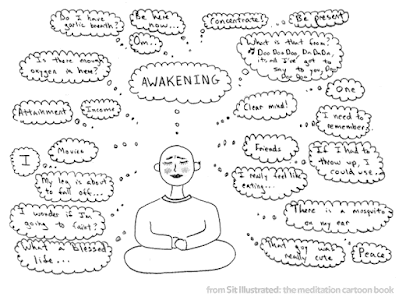By Shevlin Sebastian
The other day I read that, on an average, according to scientists, we think about 50,000 to 60,000 thoughts a day. I am not sure how they had calculated this. For a while now, I realised my mind was an endless conveyor belt of random, silly, and aimless thoughts.
One day, for
about thirty seconds, I noted down what I was thinking: I roamed through 12
different topics and thought about different people. It would have been more,
but my mind had become self- conscious.
When I told a
friend about this, she said, perhaps, the brilliant scientist Albert Einstein
would have very few thoughts, hence the clarity of his thinking. One thing is
clear: the moment you stop thinking, by listening to your breathing, you enter
the silence within you. But to silence the mind is a gargantuan task. I believe
I spend one minute out of 24 hours in the present. The rest of the time, I am
in the past or the future.
So, in this
state of pessimism, it was no surprise when I saw the book ‘Quiet your Mind by
American psychologist John Selby at the Ernakulam Public Library, I grabbed it.
There was an urgent need within me to silence the mind and expand the abilities
of the brain.
The book is a
simple and easy read. I have taken some suggestions and have tried to implement
it. The one good thing I gained from reading the book is that now I am
conscious of what I am thinking.
This slows down
the mind.
Here are some
quotes from the book:
Most of our
upsetting emotions are caused not by what’s going around us, but by fear-based
thoughts, habitually running through our minds.
All human beings
are constantly judging the world around them through ‘automatic’ thoughts.
These thoughts judge present situations based on past experience.
Our thoughts
almost always stimulate emotional responses in our bodies.
Our chronic
thoughts: memories of the past, judgements of the present, and imaginations of
the future.
As soon as you
consciously accept the truth of the moment, your heart can open, and your
intuitive mind can come into play.
You cannot
change the present moment. But reality is constantly evolving, and you can take
part in the evolution.
Anger is always
a response to thoughts running through our minds.
Our thoughts
influence our minds.
The simple act
of shifting one’s mental focus from thinking to experiencing changes one’s
basic neurological and physiological functioning.
We should
purposefully shift from a negative thought to a present-moment sensory input
such as breathing, sounds and enjoyable sights.
Conscious
perceptual shifts can change your inner experience.
In contemporary
society, there is a chronic fixation upon deductive thinking as opposed to
intuitive reflections.
In order to
enter the higher states of consciousness, we must shift our attention to the
physical sensory realm of immediate perception.
The shift to
sensory awareness quiets the usual chatter of the mind so that a deeper
intuitive experience can emerge.
When your inner
voice is habitually anxious, it thinks worried thoughts, and these generate
fearful emotions, choices, and actions.
In every
situation, consider to what extent you fully process the actual perceptive
experience as opposed to projecting what you expect to see in that
situation.
When thoughts
stop, the body knows what to do, and does it with perfection and pleasure
unknown to the thinking mind.
The key to deep sensual release lies in quieting the flow of thoughts through your mind while making love.



The quote you put on your article which says "In every situation, consider to what extent you fully process the actual perceptive experience as opposed to projecting what you expect to see in that situation." and this is the quote that is highly relevant for my struggling journey too because my educational journey has been painful and obnoxious too, severe pressure which also holds very critical value but I have find people who lifted me up to my best and raised me from ruins with heir comprehensive academic assistance across multitude of academic tasks, highly sought-after healthcare writers working for Childcare assignment writing help services.
ReplyDeleteScience assignments often demand in-depth research, precise calculations, and a clear presentation of facts. From physics and chemistry to biology, each topic requires detailed attention to theory and application. Our help with science assignment service provides expert guidance for experiments, reports, and theoretical explanations. You receive accurate, well-researched content that meets academic standards while enhancing your subject knowledge. By working with professionals, you can save time, reduce stress, and confidently tackle complex topics with a better understanding of scientific concepts.
ReplyDelete